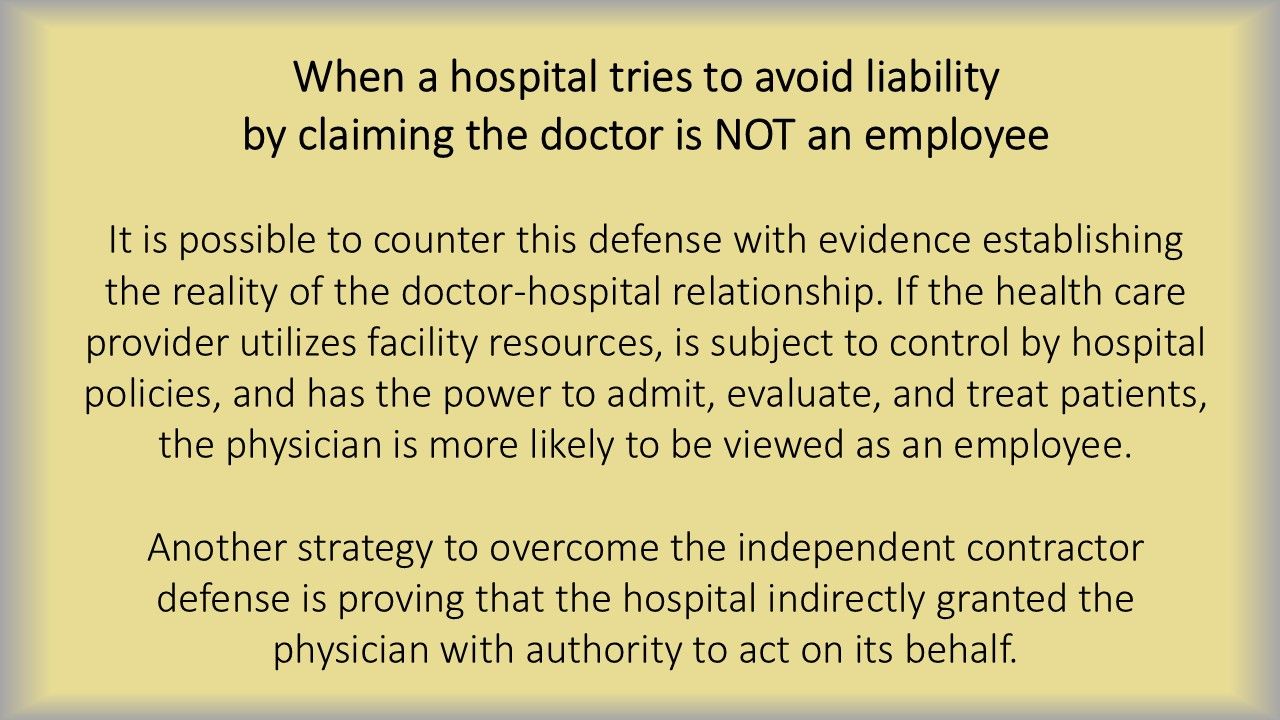Patient-12
Patient had gallbladder surgery. She continued to have health problems so they did surgery again and removed a mass from her abdomen. This case discusses hospital responsibility when the surgeon is not an employee of the hospital.
On November 12, 1974, Dr. Don L. Christensen performed surgery on appellant Beverly Oehler at respondent Humana Inc., d/b/a Humana Hospital Sunrise. Beverly continued to have health problems.
On October 19, 1982, Dr. Christensen performed gall bladder surgery upon Beverly at respondent hospital. Dr. Christensen had staff privileges with respondent, was chief of staff there in 1974 and vice chief of staff in 1982.
Beverly continued to have health problems and had surgery again on December 16, 1983, at Valley Hospital where a mass was removed from her abdomen.
The lawsuit stated that a hospital can be held liable for negligently supervising a non-employee physician with medical staff privileges under the corporate negligence theory of liability.
The concept of corporate responsibility for the quality of medical care was forcibly advanced in Darling v. Charleston Community Memorial Hosp., [33 Ill. 2d 326] 211 N.E.2d 253 (Ill. 1965), wherein the Illinois Supreme Court held that hospitals and their governing bodies may be held liable for injuries resulting from imprudent or careless supervision of members of their medical staffs.
The lawsuit alleged alleged that respondent breached its duty to supervise the quality of care Beverly received by not requiring Dr. Christensen to file reports concerning his treatment of Beverly pursuant to its own rules and regulations. Respondent argues that a hospital's duty to monitor and supervise the treatment of patients should apply only to physicians who are employees of the hospital.
We (the Nevada Supreme Court) disagreed.
The corporate theory of liability arose in part because it was difficult for patients to recover from hospitals under the theory of respondeat superior as physicians were generally considered independent contractors. See Pedroza v. Bryant, 101 Wash. 2d 226, 677 P.2d 166 (1984). Limiting a hospital's duty to supervise the treatment of patients to physicians who are employees of the hospital is directly opposed to the rationale creating the corporate theory of liability.
Therefore, a hospital may be liable for the negligent supervision of a non-employee physician who has staff privileges under the corporate negligence theory of liability.
The Nevada Supreme Court ordered a new trial.

The Nevada Supreme Court ruled that a hospital may be liable for the negligent supervision of a non-employee physician who has staff privileges under the corporate negligence theory of liability. The court ordered a new trial.
When a hospital tries to avoid liability by claiming the doctor is NOT an employee
It is common for a hospital to defend a medical malpractice claim based upon vicarious liability by asserting that the doctor was an independent contractor. However, it is possible to counter this defense with evidence establishing the reality of the doctor-hospital relationship. If the health care provider utilizes facility resources, is subject to control by hospital policies, and has the power to admit, evaluate, and treat patients, the physician is more likely to be viewed as an employee.
Another strategy to overcome the independent contractor defense is proving that the hospital indirectly granted the physician with authority to act on its behalf. This concept of “apparent agency” may attach liability to the facility when the hospital represented that the physician was an employee and the patient reasonably relied upon the representation.
Note: In the case of Patient-1, the hospital quickly reported to the patient that the surgeon (Dr. Michael Bradford) was NOT an employee of the hospital. However, similar to the case for Patient-12 (on this page), Dr. Bradford had staff privileges and held a title at the hospital. He was Chief of Surgery for Sunrise Hospital at the time of Patient-1's surgery on June 17, 2025.
See the section on Hospital Liability to learn how the Nevada Supreme Court ruled on this issue.